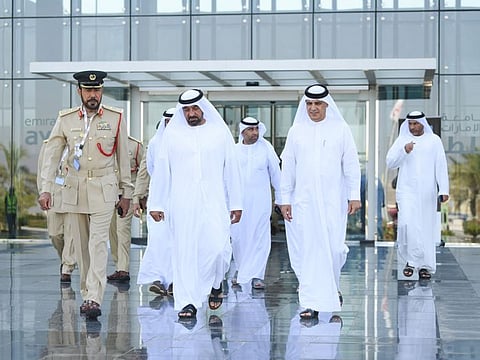How Emirates recovered quickly after COVID pandemic
Experts discuss key issues facing the industry at annual conference

Timely initiatives at the federal and emirate level, an agile, pragmatic approach, and minimal disruption to supply chains – this is how the country, and Dubai’s flagship airline Emirates, came out of the COVID-19 crisis much ahead of the curve, it was revealed at a conference recently.
Inaugurated by Sheikh Ahmed bin Saeed Al Maktoum, Chairman and CEO, Emirates Airline and Group, the 4th International Aviation Management Conference at Emirates Aviation University brought together leaders, professionals, research scholars, students and academia to discuss key strategic issues facing the industry, provide thought leadership and present ground-breaking research findings.
The conference was also a platform for authors and researchers to present around 30 papers on a wide range of topics: passenger experience during the 2022 UK airport delays; aviation and the blockchain; sustainable aviation fuel; advanced urban mobility, and the growing role of women across all fields in aviation.
Dr Ahmad Al Ali, vice chancellor, Emirates Aviation University, said: “We are building on the success of our previous three global conferences, and are focused on key topics, including sustainable aviation, technical advances, air transport policy and regulation. This conference is the definitive forum to discuss areas of mutual interest with delegates from the aviation industry – a much needed retrospective and an introspection. They bring a wealth of expertise, interesting and essential topics such as service quality, passenger satisfaction, challenges and opportunities post the pandemic.”
How Emirates tackled COVID
The Emirates Group’s senior executives expanded on how the industry and its key players have pivoted during the pandemic, and the impact it has had on projects, initiatives, technologies, and opportunities.
Adel Al Redha, Emirates’ Chief Operating Officer, said the airline continuously monitored the developments around COVID-19 in the UAE and across the globe, and strongly believed there would be greater opportunities and demand for travel post-pandemic. A key investment was in the airline’s approach to hospitality, with employees commencing training to uplift the customer experience.
Emirates also focused on enhancing its products and on introducing digital services using advanced technologies. Many initiatives, including digital applications, were introduced to enhance efficiencies in operations, he added.
Key learnings
Steve Allen, Group CEO, dnata, took the audience through key business learnings during the pandemic, including gauging demand early, the need for timely hiring and investment decisions, adapting products, and communicating constantly. He cited cautious optimism given the challenges around labour markets worldwide, inflation and economic uncertainty, balanced by travel resilience and Dubai benefiting from a reshaped world economy.
Mahmood Ameen, CEO, Emirates Flight Catering, explained the importance of adapting to the new world through next generation process re-engineering, technologies, digitalisation, and a skilled workforce.



